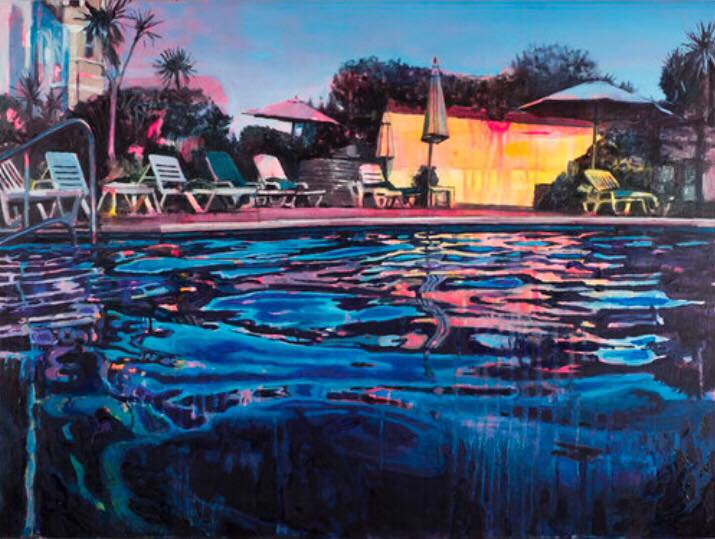How come people differ so much in their talents? I’ve always wondered about this because I am absolutely hopeless when it comes to drawing, painting or any active forms of visual expression. On the other hand, Lucinda Metcalfe is one of those astute artists that not only mesmerises you with a myriad of colours, but also she asks profound questions about matters of life and death. And I mean it! I have spent numerous tea breaks chatting to Lucinda about her art as we tried to find refuge from the demands of the teaching profession in a corner of a busy staff room. The language of abstract concepts and undefined existential anxiety has always spoken to me. Perhaps that is why I could connect with Lucinda’s paintings, that invariably led me to reconsider my place in the world.

For instance, what comes to your mind when you see the piece above entitled Yellow wall? Does it seem a luxurious holiday resort tucked away in some enclave of never-ending tropical summers? Is this a place of solace or a Mekka for disgruntled holiday-makers? Is this a sacred oasis or a profane equivalent of a tacky amusement park? I am deliberately provocative because we normally associate places like this with a sense of respite… and yet it is impossible to escape our underlying issues, no matter where we go.
I recently listened to an interesting podcast about the psychology of people who suffer from the locked-in syndrome. Even though these individuals are completely paralysed, their quality of life is not catastrophic. In fact, sometimes a very rich inner world unfolds within them and they seem to be OK enough to continue to live. Niels Birbaumer, a prominent researcher in this field, states:
“We found that quality of life is sufficient, sometimes this gets even very high, and the reason is that your thoughts, because you cannot express yourself, all the thinking which is related to ‘I want’, ‘I need that’, ‘I want to have this’, because this is never fulfilled and none of these expectancies are fulfilled, the brain learns fairly rapidly, within hours, it learns not to think voluntarily. And the consequence is that the brain stays in a more passive and sensory, in a state where everything is intake but nothing is outwards oriented.”
I am not saying that locked-in syndrome is not deeply tragic. What we learn from these people is that volition (me – me – me – I want – I want – I want) does not necessarily make the human race any happier in the long run. In contrast, Lucinda shows us tempting holiday destinations that seduce us to believe that endless consumption can give meaning to life. However, consumption can leave us disillusioned and empty… ready to avoid the inevitable. It does not matter how much we would like reality to be different, for example that difficult client, that difficult customer… that difficult relationship or that negative belief about ourselves. Unless we face reality head-on, it will come back time and time again to haunt us into oblivion. A profound sense of grounding in reality is one of your most potent resources. Have a think and consider:
What are your illusions?
What is it that you need to face head-on?
What questions can you not avoid?

Now have a look at Dusk swim by Lucinda… perhaps you are starting to see that tension between escapism, avoidance and the real and disturbing stuff of life that makes us human. Given courage, support and love we can face it though. Art can help a great deal too. For instance, Lucinda says: “Acknowledging the disturbance in an image, or as Roland Barthes puts it ‘the punctum’, we are put in touch with reality. In this way only can we grow truly.” Isn’t it one of the most important things of life to grow out of our illusions? Growing up psychologically is painful and worth it. Rather than being suspended in the loneliness of the human condition, we can learn to appreciate life as it is and stay nourished by the imperfect connections that fate sends our way.

O.K. what do I really mean here? The more you let go of your childhood belief about Santa Claus, the sooner you will develop into a competent adult that can earn a decent salary and go to the shop to get your own gifts…! Oops, am I talking here about consumption again? Well, you always have the option of buying the newest edition of Tolstoy’s War and peace if you crave some high-brow entertainment. Or better, you could go to a gallery and see if art can answer some of your questions of life and death. For me, it partially does! In the meantime, enjoy Lucinda’s last piece entitled Rainbow shadows, that, to me, introduces a sense of hope. The deeper your encounter with reality, the wider your field of view. It’s not easy and it is worth it. Trust me!
If you would like to know more about Lucinda’s work visit her website
https://www.lucindametcalfe.com/
Inspired by:
http://www.abc.net.au/radionational/programs/allinthemind/frontiers-of-the-changeable-brain/9489666